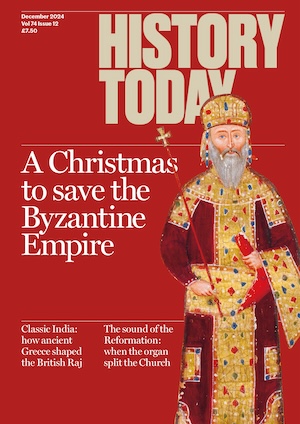The Death of Lord Acton
An overview of the life of Lord Acton of Aldenham, one of the founders of the English Historical Review and Regius Professor of Modern History at Cambridge.
 That power tends to corrupt and absolute power corrupts absolutely is possibly the most famous maxim ever to emanate from a historian. It appears in one of Lord Acton’s letters to his historian friend Mandell Creighton. Not much else has survived of Acton in the general memory-pool. For all the vast erudition which so impressed his contemporaries – Creighton called him ‘the most learned Englishman alive’ – he wrote disappointingly little. He enjoyed an ample private income and seldom had anything that could be called a job, while when measured for his Master of Arts cap at Cambridge he proved to have the largest head on record. Even so, he wrote no books and produced only a few papers and lectures, though he amassed an enormous hoard of notes. Perhaps Acton was the man who knew too much. He was a campaigner for a scientific approach to the understanding of history and an advocate of resistance to power, in state or church. Though he was a devout Roman Catholic, for whom communion with Rome was ‘dearer than life’, his disapproval of arbitrary power put him seriously at odds with the Roman Catholic hierarchy.
That power tends to corrupt and absolute power corrupts absolutely is possibly the most famous maxim ever to emanate from a historian. It appears in one of Lord Acton’s letters to his historian friend Mandell Creighton. Not much else has survived of Acton in the general memory-pool. For all the vast erudition which so impressed his contemporaries – Creighton called him ‘the most learned Englishman alive’ – he wrote disappointingly little. He enjoyed an ample private income and seldom had anything that could be called a job, while when measured for his Master of Arts cap at Cambridge he proved to have the largest head on record. Even so, he wrote no books and produced only a few papers and lectures, though he amassed an enormous hoard of notes. Perhaps Acton was the man who knew too much. He was a campaigner for a scientific approach to the understanding of history and an advocate of resistance to power, in state or church. Though he was a devout Roman Catholic, for whom communion with Rome was ‘dearer than life’, his disapproval of arbitrary power put him seriously at odds with the Roman Catholic hierarchy.
The Actons came from Aldenham Hall in Shropshire, but the copiously christened John Emerich Edward Dalberg Acton was born in Naples in 1834. His father had inherited the Acton family baronetcy and his mother was the heiress of a German nobleman, the Duke of Dalberg. He was the nephew of a cardinal and the grandson of a remarkable adventurer, Sir John Acton, who was an admiral in the Neapolitan navy and chief minister of the Two Sicilies. The little boy’s father died when he was only three and he inherited the baronetcy in his turn. His widowed mother married George Leveson-Gower, a future foreign secretary as Lord Granville, which gave her son a foothold in aristocratic Whig-Liberal circles.
Although he would end up as Regius Professor, the youthful Acton could not go up to Cambridge University because he was a Roman Catholic. Study in Munich with the German historian Ignaz von Döllinger grounded him in the latest German trends in historical scholarship. In his twenties he spent a few silent and inconspicuous years as an MP. He became an intimate friend and adviser of Gladstone, who made him Lord Acton of Aldenham in 1869, and he edited a Roman Catholic monthly in a spirit which did not endear him to conservatives. He also married his Bavarian cousin, Countess Marie von Arco-Valley.
When the struggle over the doctrine of papal infallibility came to a head at the Vatican Council of 1870, Acton went to Rome to rally opposition to it. The dogma was duly promulgated by Pius IX and Döllinger was excommunicated, but Acton dutifully submitted. In 1886 he helped to found the English Historical Review and in 1895 Lord Rosebery made him Regius Professor of Modern History at Cambridge. Acton’s inaugural lecture, in which he urged the importance in writing history of both objective treatment of evidence and confident moral judgement, made a powerful impression and he was closely involved in the plan for the monumental Cambridge Modern History, though he did not live to see it.
In the spring of 1901 Acton’s health broke down. The doctors diagnosed ‘a strong gouty tendency’ and he retreated to his Bavarian mountain chalet, the Villa Arco at Tegernsee, but in June 1902 he suffered a severe stroke. After receiving the last rites of the church, he died at three o’clock in the afternoon in his wife’s arms, aged sixty-eight. He was laid out in his magnificent crimson Cambridge robes and buried in the local cemetery beside the lake. ‘Religion alone,’ he had once made a note, ‘makes a good death.’




